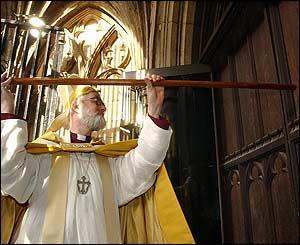Appropriating the Past through Worship

I have just finished Rowan Williams' Why Study the Past, a succinct argument for reading and understanding church history. Williams claims that what he calls the "charismatic memory of the Church" is most clearly understood in our worship: "when we sing canticles, psalms and classical hymnody we express a unity across time as well as a unity in space," (92). This has certainly been my experience and part of my argument in the courses I teach in worship. In fact, this is part of the reason why I emphasize participating in that corporate worship experientially during valuable class time.
Here is how the Archbishop frames it:
"This is where the primary record of God's self-communication, the Bible, is read, not as a relic of the past but as bearing the present communication of God. This is where, from the earliest days of the Church, martyrs have been commemorated and celebrated, where transformed lives are held up to us. And the language of this event is one that is inevitably and rightly not simply contemporary, but a speech formed by generations of practice; where praise is offered not only in the words that are straightforwardly our own, today's words, but in words used and inherited."
It is ultimately this common practice, this habit of inherited speech and 'charismatic' remembering, as Williams calls it, that gives us a sense of who and whose we are. When preaching takes place within this context, it is, as Will Willimon says, "peculiar speech" that operates within a domain of distinctive discourse, (Peculiar Speech: Preaching to the Baptized, 6). In a culture caught up in everything "new," however, this seems not only quaint but irrelevant. Helping students negotiate this tension is absolutely central to my teaching.


<< Home